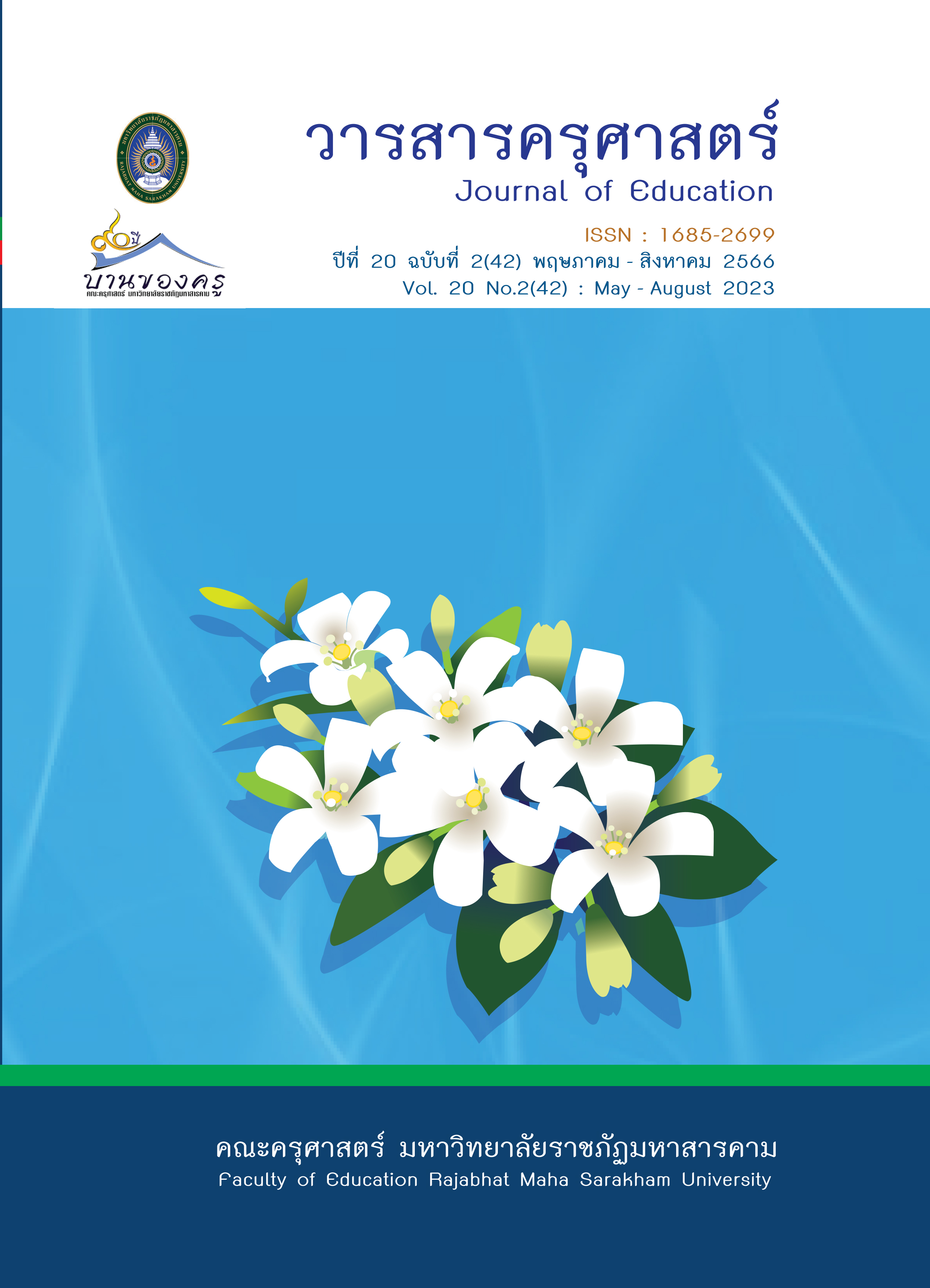A Study of Teachers’ Beliefs and Ability to Solve Mathematical Problems of Lower Secondary School Students Under Mahasarakham Provincial Administrative Organization
Main Article Content
Abstract
The purposes of this research were to (1) study beliefs in mathematics of lower secondary teachers, (2) study ability to solve mathematics problems of secondary school students and (3) study the teachers’ beliefs and the ability to solve mathematics problems of lower secondary school students. The samples were 10 mathematics secondary school teachers and secondary school students of the teachers, acquired by simple random sampling. The research instrument were a questionnaire of teacher beliefs, a questionnaire of teacher beliefs and mathematical problem-solving, a test of mathematical problem-solving abilities and an interview form of teacher beliefs. The data analysis statistics were percentage, mean, standard deviation together with task analysis and descriptive analysis.
The results of the research were as follows; (1) The sample teachers were teaching in lower secondary, 5 teachers believed in constructivist theory and the other 5 teachers believed in absolute theory. (2) The students who studied with the group of constructivist belief teachers had average score of 97.00% and the group of absolutist belief teachers had average score of 93.33%. (3) Teacher’s belief and ability to solve mathematics problems of students in the group of constructivist belief teachers had faith that the teachers teach in following the problem-solving process and used variety of tactics to solve problems for students understanding. Students of the absolutist belief teachers had faith that the teachers used the easiest method to solve problems and provide examples along with the exercises in student textbooks.
Article Details

This work is licensed under a Creative Commons Attribution-NonCommercial-NoDerivatives 4.0 International License.
ข้อกำหนดเบื้องต้นที่ผู้นิพนธ์(ผู้ส่งบทความ) ควรทราบ
1. ผู้นิพนธ์ที่ประสงค์จะลงตีพิมพ์บทความกับวารสาร ตั้งแต่เดือนมกราคม 2563 เป็นต้นไป ให้ใช้รูปแบบใหม่ (Template 2563) โดยสามารถดูตัวอย่างได้ที่เมนู GUIDELINES
2. จะตีพิมพ์และเผยแพร่ได้ ต้องผ่านการประเมินจากผู้ทรงคุณวุฒิ (Peer Review)
3. การประเมินบทความโดยผู้ทรงคุณวุฒิ (Peer Review) เป็นแบบ Double Blind
4. การอ้างอิงบทความใช้หลักเกณฑ์ APA (American Psychological Association) คลิก
5. บทความถูกปฏิเสธการตีพิมพ์ ไม่ผ่านการประเมิน ผู้นิพนธ์ขอยกเลิกเองหรือชำระเงินก่อนได้รับการอนุมัติ ทางวารสารไม่มีนโยบายการคืนเงิน
References
ชุติมา คำธะนี. (2551). อิทธิพลของความเชื่อทางคณิตศาสตร์ของครูที่มีต่อการจัดกิจกรรมการเรียนรู้ในชั้นเรียนคณิตที่ระดับมัธยมศึกษา. มหาวิทยาลัยขอนแก่น.
ทนงเกียรติ พลไชยา. (2556). การศึกษาความสัมพันธ์ระหว่างความเชื่อ เมตาคอกนิชั้น ความเข้าใจ มโนทัศน์และความสามารถในการแก้ปัญหาทางคณิตศาสตร์เรื่อง ฟังก์ชัน ของนักเรียนโรงเรียนจุฬาภรณราชวิทยาลัย.[วิทยานิพนธ์ปริญญาดุษฎีบัณฑิต]. สำนักวิทยบริการและเทคโนโลยีสารสนเทศ มหาวิทยาลัยราชภัฏมหาสารคาม. http://fulltext.rmu.ac.th/fulltext/2556/109662/abstract.pdf
ไมตรี อินทร์ประสิทธิ์. (2546). การปฏิรูปกระบวนการเรียนรู้การเรียนรู้วิชาคณิตศาสตร์ในโรงเรียนโดยเน้นกระบวนการทางคณิตศาสตร์. ขอนแก่นการพิมพ์.
ยุทธพงศ์ ทิพย์ชาติ. (2556). การศึกษาผลของความรู้ และความเชื่อของนักศึกษาครูที่มีต่อการฝึกปฏิบัติการสอนคณิตศาสตร์. [วิทยานิพนธ์ปริญญาดุษฎีบัณฑิต]. สำนักวิทยบริการและเทคโนโลยีสารสนเทศ มหาวิทยาลัยราชภัฏมหาสารคาม. http://fulltext.rmu.ac.th/fulltext/2556/109393/title.pdf
สุรศักด์ิ ตุลาเนตร. (2559). ความเชื่อของนักศึกษาครูเกี่ยวกับการ สอนคณิตศาสตร์ในบริบทที่ใช้การศึกษาชั้นเรียน และวิธีการ แบบเปิด. วารสารวิจัย มหาวิทยาลัยขอนแก่น. 4(2),57-77.
อรยมล แย้มโอษฐ์. (2549). ระบบความเชื่อทางคณิตศาสตร์ของนักเรียนในสถานการณ์ทารแก้ปัญหาทางคณิตศาสตร์. มหาวิทยาลัยขอนแก่น.
อภิณห์พร มานิ่ม. (2553). การใช้รูปแบบเอสเอสซีเอส เพื่อส่งเสริมความสามารถในการแก้โจทย์ปัญหาคณิตศาสตร์ เรื่อง อสมการ ของนักเรียนชั้นมัธยมศึกษาปีที่ 3. [วิทยานิพนธ์ปริญญามหาบัณฑิต ไม่ได้ตีพิมพ์]. มหาวิทยาลัยเชียงใหม่.
อัมพร ม้าคนอง. (2553). ทักษะและกระบวนการทางคณิตศาสตร์ การพัฒนาเพื่อพัฒนาการ. โรงพิมพ์แห่งจุฬาลงกรณ์มหาวิทยาลัย.
Alina felicia roman. (2015). A study of teacher’s beliefs about learning management affectingmathematical attitudes of lower secondary school students.
Amy Scrinzi. (2011). An examination of the relationships between kindergarten teacher’s beliefs, Mathematical knowledge for teaching and instructional practice.
Borkow, H., & Pullman, R.T. (1995). Expanding Teacher’s knowledge base: A cognitive Psychological Perspective on professional development. Teacher College Press.
Brickhouse, N. W. (1990). Teacher’s beliefs about the nature of science and their relationship to classroom practice. Journal of Teacher Education.
Cochran-Smith, M. (2003). Leaming and unlearning: The education of teacher educators. Teaching and Teacher Education.
Calderhead, J. (1996). Teachers Belief and knowledge. Simon & Schuster Macmillan.
Caroline Robert. (2019). Five-Year Outcomes with Dabrafenib plus Trametinib in Metastatic Melanoma.
Ernest, P. (1992). The nature of mathematics: Towards a social constructivist account. Science and Education.
Fishbein, M. and I. Ajzen. (1975). Beliefs Attitude, Intention and Behavior: An Introduction to Theory and Research, Addison-Wesley Publishing Company.
Ginsbarg & Opper, Sylvia. (1969). Piaget’s theory of intellectual development. An introduction. Englewood Cliffs, N.J. Prentice-Hall.
Gunes Yavuz. (2014). The perceived problem soiving skills of primary mathematics and primary social sciences prospective teachers.
Jathan Wellington Austin (2012), On the Alignment of pre-service teacher’s personal mathematics teacher efficacy beliefs and mathematical knowledge for teaching.
Paul Conley. (2017). Mathematics Teacher’s Beliefs and Mathematical knowledge for teaching how teacher’s mkt shifts in planning and impacts their Beliefs and instructional practice.
Stephanie Herppich. (2018). Teachers’ assessment competence: Integrating knowledge process and product oriented approaches into a competence-oriented conceptual model.


